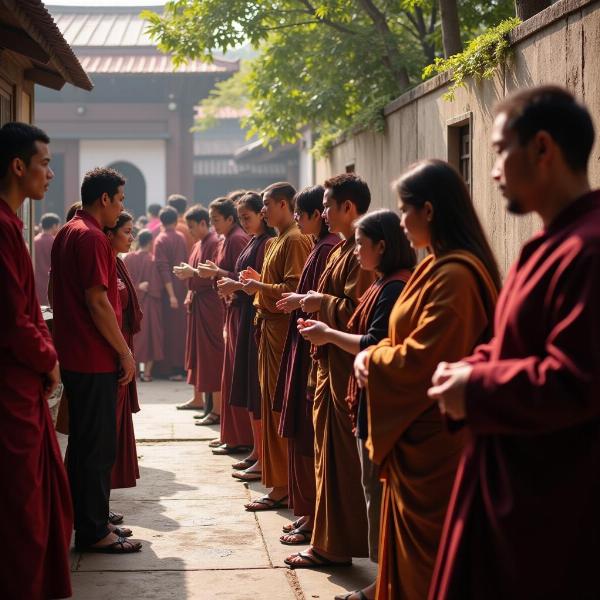Understanding the phrase “you have to wait” and its nuances in Hindi is crucial for effective communication. Whether you’re navigating daily conversations, conducting business, or simply trying to grasp the cultural context, knowing the appropriate Hindi equivalent is essential. This article delves into various translations, their subtle differences, and the cultural implications of waiting in India.
Different Ways to Say “You Have To Wait” in Hindi
Hindi offers several ways to express the idea of waiting, each carrying a slightly different connotation. Let’s explore some common translations:
-
Aapko intezaar karna hoga (आपको इंतज़ार करना होगा): This is a formal and respectful way to say “you have to wait.” It emphasizes the obligation to wait. This is suitable for addressing elders or people in positions of authority.
-
Aapko rukna hoga (आपको रुकना होगा): This translates to “you have to stop” or “you have to stay.” While not a direct translation of “wait,” it conveys the idea of pausing and remaining in place until a certain time or event.
-
Thoda intezaar kijiye (थोड़ा इंतज़ार कीजिए): Meaning “please wait a little,” this phrase is polite and commonly used in everyday conversations. The addition of “thoda” (little) softens the instruction.
-
Bas thodi der (बस थोड़ी देर): This translates to “just a little while” and is a more informal and casual way to tell someone to wait. It’s often used among friends and family.
-
Zara sabar kijiye (ज़रा सब्र कीजिए): Meaning “please have a little patience,” this phrase emphasizes the virtue of patience while waiting. It’s often used in situations where the wait might be longer or more inconvenient.
Cultural Significance of Waiting in India
Waiting is often an integral part of life in India. From queuing for public transport to awaiting administrative processes, patience is a virtue often tested and celebrated. This cultural context influences the language and expressions used around waiting. The emphasis on politeness and respect, even while asking someone to wait, reflects the importance of social harmony.
Patience as a Virtue
Indian culture emphasizes patience (sabar) as a valuable quality. Many traditional stories and religious teachings highlight the importance of waiting and enduring hardships. This cultural emphasis often makes waiting more acceptable and less frustrating for Indians compared to cultures that prioritize speed and efficiency.
 Waiting in Indian Culture
Waiting in Indian Culture
Practical Applications and Examples
Understanding the appropriate context for each phrase is key to effective communication. For instance, using “bas thodi der” with a senior citizen might be considered disrespectful. Similarly, using “aapko intezaar karna hoga” with a friend might sound overly formal.
- At a doctor’s office: “Thoda intezaar kijiye” or “Zara sabar kijiye” would be appropriate.
- Asking a friend to wait: “Bas thodi der” or “Thoda intezaar kar” (a less formal version of “thoda intezaar kijiye”) is suitable.
- In a business setting: “Aapko intezaar karna hoga” or “Aapko rukna hoga” would be more appropriate, depending on the level of formality required.
Conclusion: Choosing the Right Phrase
As we’ve explored, “you have to wait” has several Hindi translations, each with its own nuance and cultural implication. By understanding these subtle differences, you can communicate effectively and respectfully in various situations. Choosing the right phrase demonstrates cultural sensitivity and fosters positive interactions. So, whether you’re asking a friend to hold on or addressing a superior, now you have the linguistic tools to navigate the art of waiting in Hindi.
FAQ
-
What is the most polite way to say “you have to wait” in Hindi? Aapko intezaar karna hoga or Zara sabar kijiye are polite options.
-
Is it considered rude to ask someone to wait in India? Not necessarily, but it’s important to do so politely and respectfully.
-
What is the difference between “intezaar” and “rukna”? Intezaar means to wait specifically, while rukna means to stop or stay.
-
Can I use “bas thodi der” with anyone? It’s best to use this informal phrase with friends and family, not with elders or superiors.
-
Why is patience considered a virtue in India? Cultural and religious teachings emphasize the importance of patience in navigating life’s challenges.
Meaning-Hindi.in: Your Partner for Accurate Hindi Translations
Meaning-Hindi.in is your trusted source for accurate and culturally sensitive Hindi translations. We specialize in various translation services, including business and commercial documents, legal and certified translations, technical manuals, website localization, educational and academic materials, and expedited translation services. Our expert team understands the nuances of Hindi and English, ensuring your message is conveyed effectively. Need a reliable Hindi translation? Contact us at [email protected] or call us at +91 11-4502-7584. Meaning-Hindi.in is dedicated to bridging the language gap and facilitating clear communication.